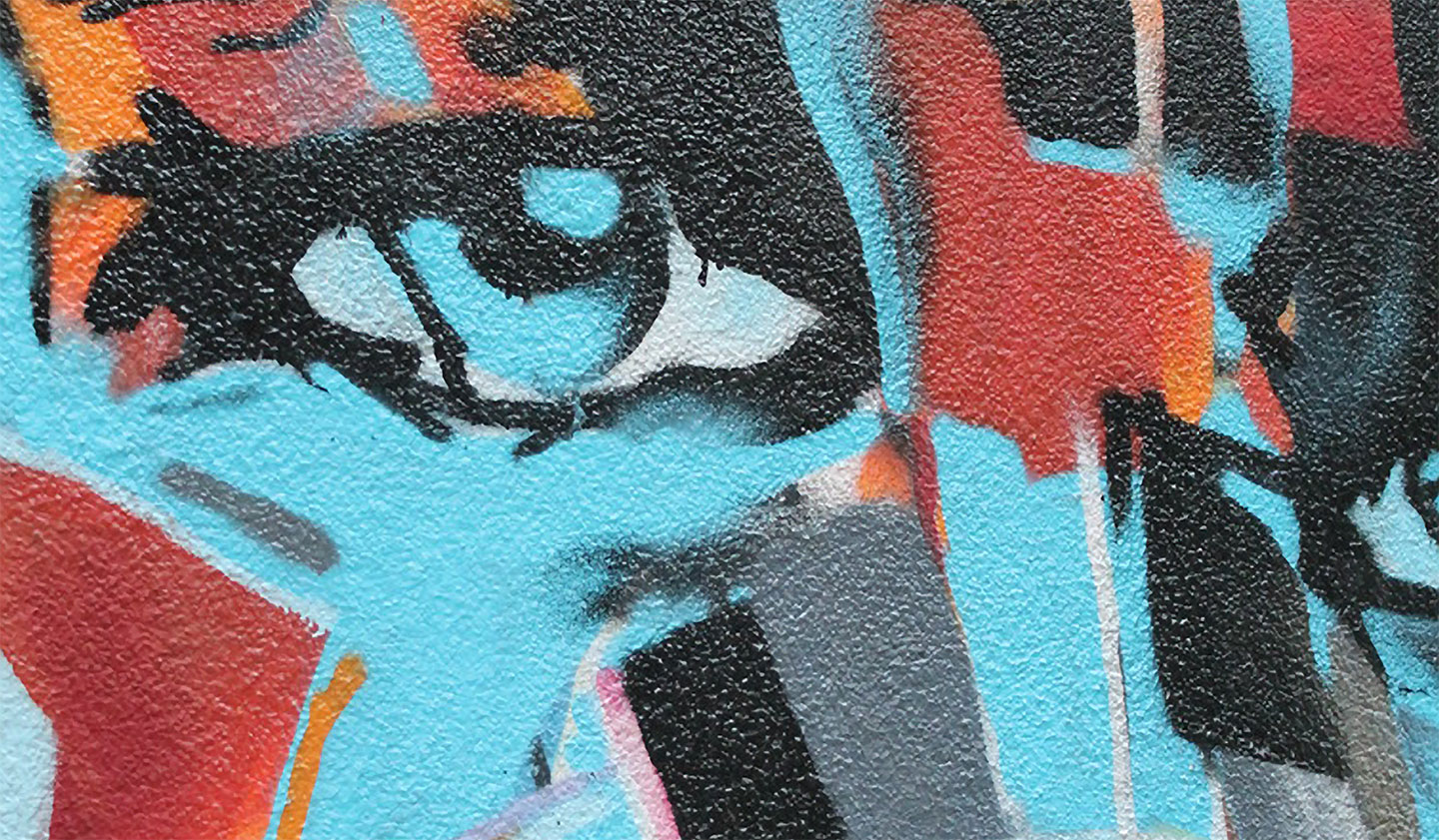Exploring Human Rights Issues
by Amy Wagner
Summer program in Croatia
focuses on transitional justice
Although 20 years have passed since Croatia won its hard-fought war of independence from Yugoslavia, the newest member of the European Union continues to grapple with transitional justice issues stemming from past human rights abuses.
For 12 days this summer, the Adriatic island of Cres – with its postcard-perfect beaches and picturesque medieval villages – was home to Montclair State students who were taking part in “Transitional Justice and the Politics of Memory,” the University’s first study-abroad program in Croatia.
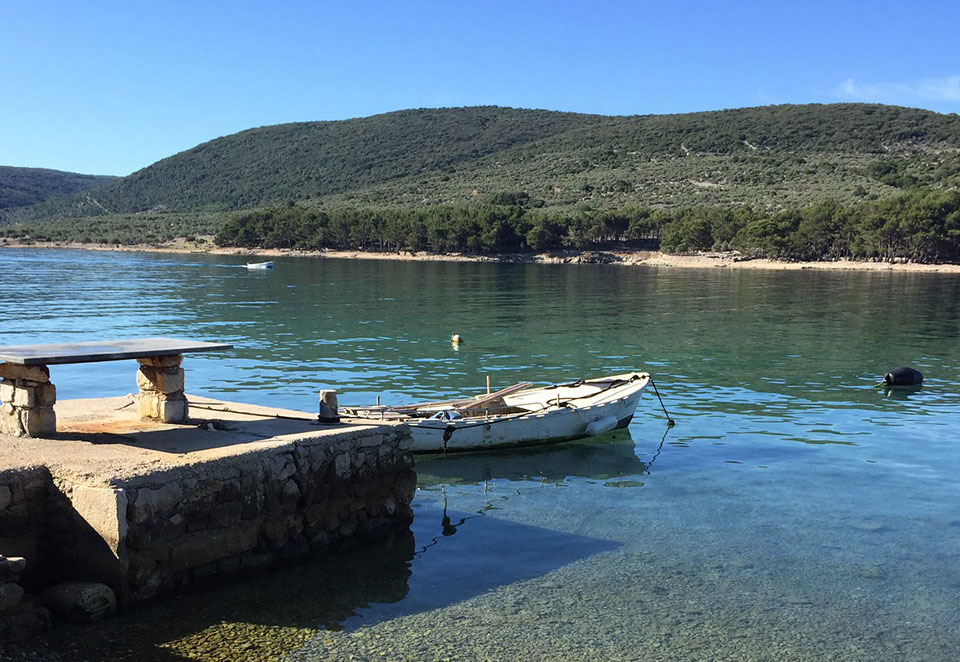
The view of the bay next to the hostel where the students lived while in the program. Photo courtesy of Arnaud Kurze
Thanks to its location at the crossroads of Central Europe, Southeast Europe and the Mediterranean, Croatia’s rich history reflects centuries of the region’s turbulent geopolitical shifts. Focusing on Croatia’s recent state-building efforts, the summer program included on-campus coursework and also provided students with invaluable on-the-ground insights into the radical political changes in the Mediterranean region, from Middle East and North Africa (MENA) to the former Yugoslavia.
“This program is crucial for our students,” explains Justice Studies Professor Arnaud Kurze, who led the unique summer program. “It offers them an opportunity to travel and explore major human rights issues in a post-conflict region that is slowly transitioning.”
Kurze notes that while the Balkan region provided the context for an in-depth exploration of human rights issues, discussions extended to violations in Africa and to those even closer to home in places like Ferguson, Missouri.
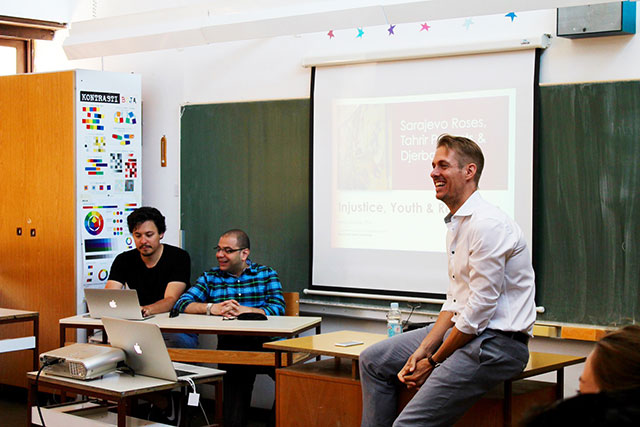
Arnaud Kurze addresses students in the transitional justice course in Rijeka. Photo courtesy of Arnaud Kurze
An immersive international experience
An expert on transitional justice, social movements and human rights and a former Woodrow Wilson fellow, Kurze developed the program three years ago with scholars Christopher Lamont, a professor of International Relations at the University of Groningen in the Netherlands; Vjeran Pavlakovic, chair of the Department of Cultural Studies at the University of Rijeka in Croatia; and Mieczyslaw Boduszynski, a professor of Politics and International Relations at Pomona College – all of whom joined Kurze as members of this summer’s faculty.
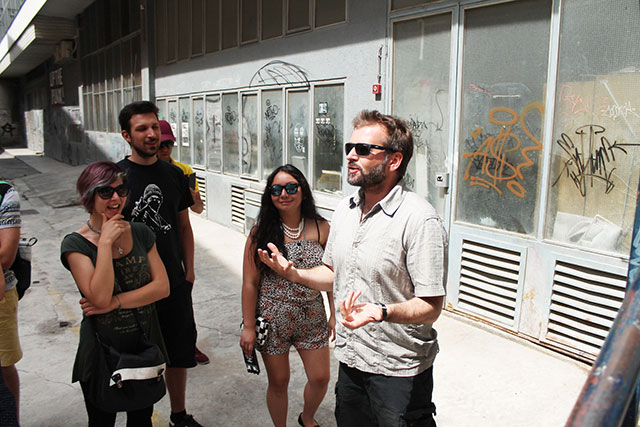
Dr. Vjeran Pavlakovic, chair of the Department of Cultural Studies at the University of Rijeka, gives a tour of sites of political memory. Photo courtesy of Arnaud Kurze
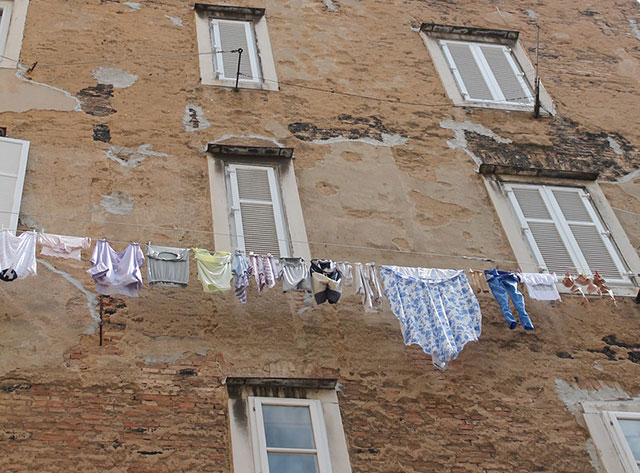
Laundry on the line in Rijeka, Croatia. Photo courtesy of Arnaud Kurze
After joining the Montclair State faculty in fall 2014, Kurze worked with Justice Department Chair Jessica Henry, Executive Director of International Affairs Marina Cunningham and Global Programs Coordinator Wendy Gilbert-Simon to make the program available to Montclair State students. The result was that Montclair State joined Pomona College, the University of Rijeka and the University of Groningen as an organizer of this summer’s program.
“Croatia, which is a rapidly developing democracy, represents a part of the world that has transformed itself and can provide a tremendous source for discovery in history, geopolitics, economics and Southern Slavic culture,” says Cunningham.
The innovative international summer program attracted undergraduate students from Montclair State and Pomona College, as well as graduate students from the Netherlands, Croatia, Albania, France, Germany and Belgium and a law student from Indiana University.
“Croatia, which is a rapidly developing democracy, represents a part of the world that has transformed itself and can provide a tremendous source for discovery in history, geopolitics, economics and Southern Slavic culture.”
– Marina Cunningham
Kurze, Lamont, Pavlakovic and Boduszynski were joined by six other distinguished scholar-lecturers from universities in the U.S., Egypt, Italy, the Netherlands, Croatia, and Denmark, as well as lawyers, historians, former diplomats and experts who work with the International Criminal Tribunal for the former Yugoslavia. This diverse group of experts shared with the students their insights, knowledge and wide-ranging perspectives about everything from international criminal law and Middle Eastern politics, to transitional justice and international human rights law.
With their guidance, students explored transitional justice measures that have been put in place to remedy a lasting legacy of human rights abuses in Croatia and MENA. They also examined the ways in which official political versions of recent historic events depart from – and often repudiate – the collective and individual memories of eyewitnesses.
“The students were able to talk to these scholars and experts who were willing to spend time outside the classroom to answer questions and further discuss any sociopolitical issues touched upon in their lectures,” Kurze recalls. “There were also many opportunities for them to apply theory in an interactive classroom setting that was filled with role play, simulations and seminar-style discussions.”
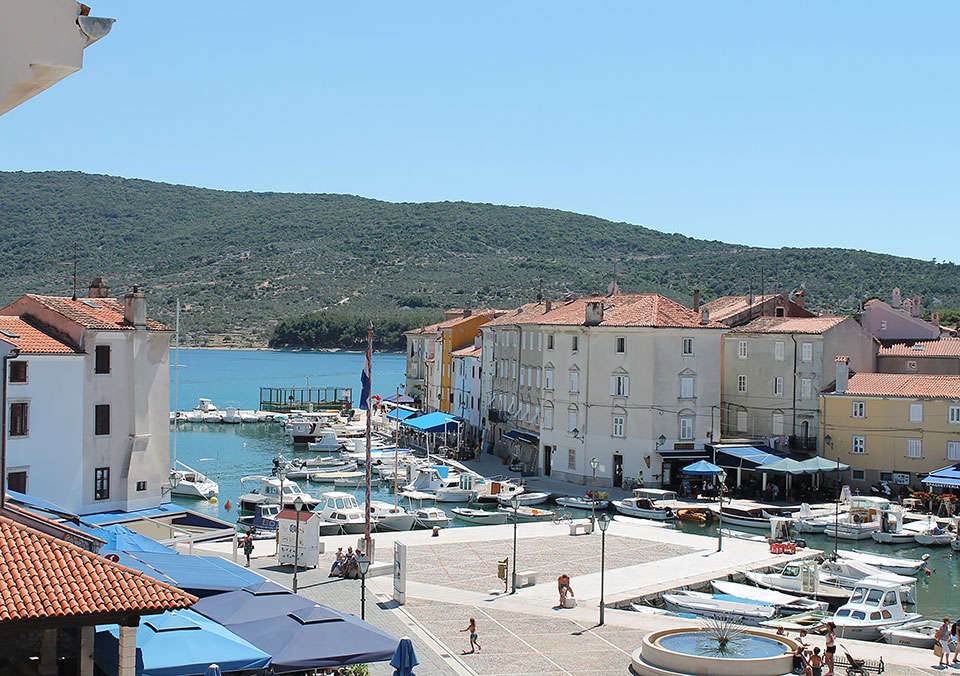
The harbor of the village of Cres on the island of Cres in Croatia. Photo courtesy of Arnaud Kurze
An eye-opening experience
On a typical day, students got up at 7 or 8 a.m. ready to immerse themselves in the program’s daily seminars and working-group sessions. They also had ample time to explore the island of Cres and experience local culture and cuisine.
“We didn’t want the students to be crammed,” says Kurze. “We wanted them to be able to enjoy the island.” On weekends the group explored local villages and beaches and traveled to the historic port city of Rijeka, which rivaled Venice when it was part of the Austrian Habsburg Empire. Students were able to visit sites that express collective memories of Croatia’s war of independence.
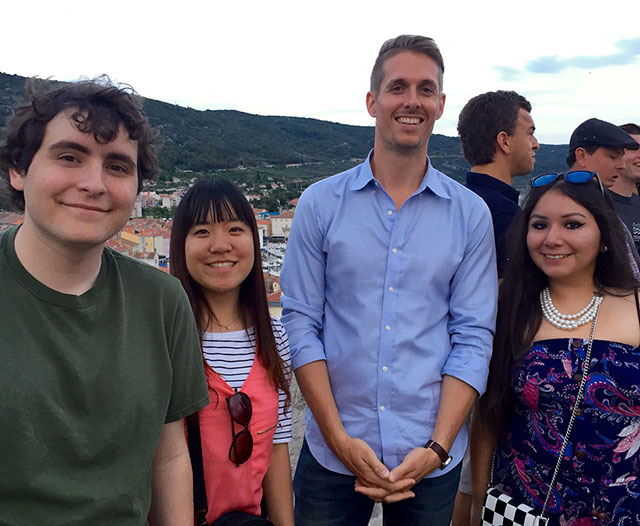
Adam Cohen, Jihae Woo, Arnaud Kurze and Shirley Layme-Sosa on the island of Cres. Photo courtesy of Arnaud Kurze
For Shirley Layme-Sosa ’15, the program was transformative. “It is important to not live in a bubble, doing the same thing day after day,” she explains. “I learned a lot about Croatian culture – and also learned a lot about myself.”
“I loved how beautiful Cres was – especially its nature – with its crystal blue waters and mountains,” says Layme-Sosa, who had participated in the US-China Summit Program last summer with the other Montclair State students in the Croatia program. “It was another wonderful opportunity to be a part of and get to know a whole new group of people from around the world. I’d love to go back to Croatia.”
Korea native Jihae Woo signed up for the program because it related directly to her international justice major. “It was a great experience. It not only gave me academic credit, but also opened my eyes,” Woo recalls. “I met great scholars who work in different fields – from universities to NGOs and international tribunals – as well as students from different countries and backgrounds.”
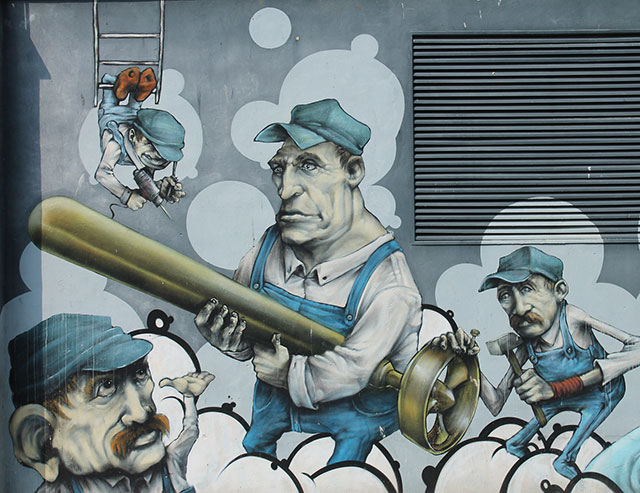
Graffiti alluding to the economically endagered shipyard in Rijeka, a port city of Croatia. Photo courtesy of Arnaud Kurze
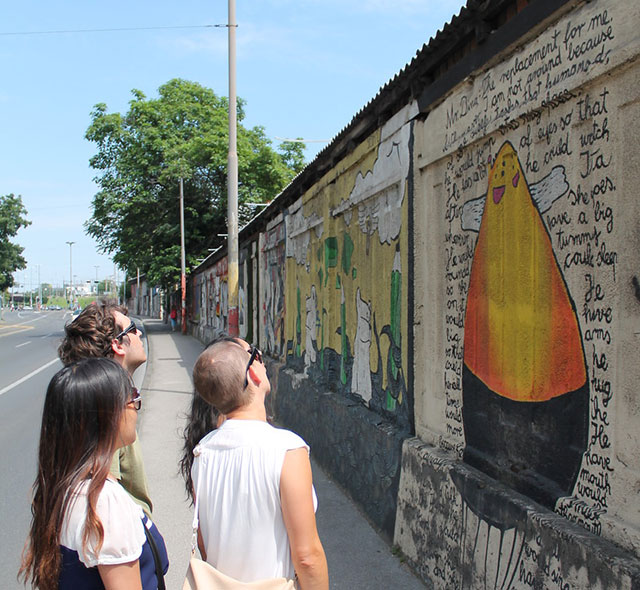
Students viewing the first publicly supported graffiti art project in the new millennium in Croatia’s capital Zagreb. Photo courtesy of Arnaud Kurze
Charting a course
“There was a great discussion environment,” political science major Adam Cohen recalls. “On multiple occasions, I was struck by how lucky I was to be on the beaches of Croatia getting to discuss some incredibly controversial subjects with people from all over the world.”
Cohen decided to enroll in the program hoping its in-depth, on-site exposure to places where issues stemming from Bosnian genocide in the 1990s would help him decide whether or not to double major in Justice Studies.
Cohen, who was thrilled to meet so many experts in the field of international justice, says the program definitely helped to direct his focus toward Justice Studies. “For now, I am on the path.”
According to Gilbert-Simon, the program has a bright future. “It appeals to a whole other set of students who are looking for a creative experience. We are talking to School of Communication and Media faculty about the possibility of opening it up to some of their students next year.”
Cunningham would like to chart a more global course as well. “I‘m hoping we can expand the program and eventually proceed to a next step, of seeking a collaborative partnership with a Croatian institution,” she says.
A global perspective
According to Kurze, the program successfully expanded his students’ horizons, giving them a new perspective on and understanding of the region’s problems and issues. “I wanted them to open up their tool kits,” he says. “Overall, this was a culturally enriching experience, a great sociopolitical learning environment and a tremendous opportunity for personal growth and to form lasting networks with peers and faculty from around the world.”
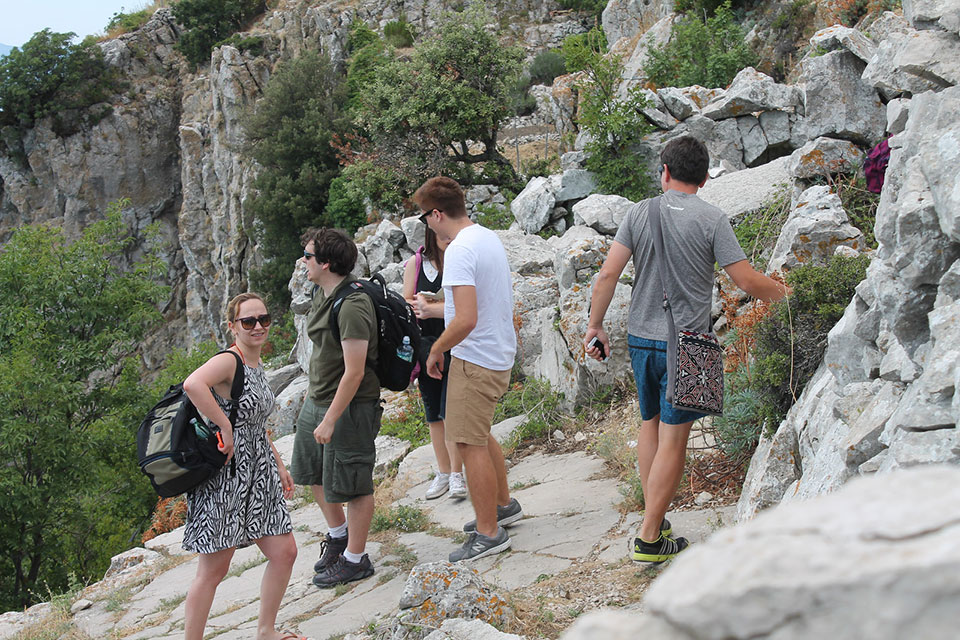
Students hiking to a remote beach on the island of Cres. Photo courtesy of Arnaud Kurze
For Cohen, the program exceeded all expectations by doing just that. “I met great people. All the relationships I built will hopefully grow and develop,” he says. “I participated in an awesome class filled with absolutely great lectures and presentations and got to explore a new land.”
